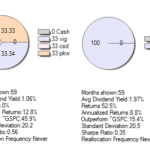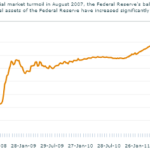It wasn’t long ago that Jack Bogle was a lone voice advocating to Wall Street aficionados how diversified portfolios were the way of the future.
Those investors “in-the-know†mocked the Vanguard Group founder for his “preposterous†theory that matching the returns of the market would be a better bet than the more “lofty†endeavor of stock picking with the goal of beating the market. It became so famous that it was known on Wall Street as Bogle’s folly.
Yet over time as the decades past, Jack Bogle was joined by powerful names in the financial industry, even by renowned stock picker, Warren Buffett, in advocating for the benefits of a diversified portfolio.
Each had a slightly different perspective but both opinions boiled down to the same advice for retail investors: pick an ETF, or exchange-traded fund, that matches the returns of the stock market and you’ll beat most so-called professionals over the long term.
For Buffett, an ETF doesn’t make sense. He knows how to pick stocks set to outperform over the long-term better than just about anyone else on the planet. But for most investors who spend the majority of their days working for a living, an ETF that provides diversified exposure to a sector, index, or geography makes a ton of sense.
Buffett was so convinced in the logic that the returns of the market would beat the best stock pickers in the world that he made a bet for charity over a ten year period that he would be proven right. And he won!
Over time, the benefits of diversification gathered steam among the mainstream media and the financial industry more broadly. So much so that a new industry – the robo-advisor industry – was born around the time of the 2008 crash.
So, if a diversified portfolio is a good thing in the long run and ETFs are a way to create a diversified portfolio, what should you look for when you evaluate a broker who specializes in ETFs?
The best brokers for ETF trading won’t always win on the cost of commissions alone. However, brokers who offer no-commissions ETFs win brownie points because that means buying and selling the ETF doesn’t cost you a penny.
Just because commissions costs don’t set you back any money doesn’t mean ETFs don’t have associated costs – they do, and they’re called expense ratios.
To mimic the performance of an index or benchmark, say the S&P 500, an ETF must be modified regularly and has associated managerial and operating costs, which are bundled into a fee, called the expense ratio.
Some mutual funds have very high expense ratios but on average you will see lower expense ratios among popular ETFs, especially those that track market indices.
Beyond the cost of commissions and expense ratios, keep an eye out for another ‘gotcha’ which is the account balance minimum imposed by brokers. If you have a big account size, don’t worry. But some brokers impose minimums that range from a few thousand dollars to tens of thousands of dollars.
Some brokers will shine when it comes to passive investing and others will win the battle for low cost ETF investing. Still others will be best for active traders who want to dip in and out of the market in a hurry while other groups will prefer brokers that provide tools, research, and back-testing simulators.
Regardless of which kind of trader you are, an ETF broker that best fits your needs can be identified but don’t rush in and set up an account until you’ve done your homework and know which broker fits your needs across the spectrum of criteria, including commissions costs, no-commissions ETF selection, tools, research, and chart studies to name but a few!











{ 0 comments… add one now }